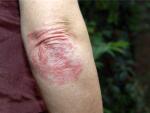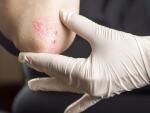
Living with psoriasis can be challenging. Not only is this chronic skin condition physically uncomfortable, but it can have social and emotional effects as well. If you are struggling to find psoriasis relief, don’t give up.
Though there isn’t a cure, there are a number of treatments to explore, and more are coming to the market every year. Treatments for psoriasis today are more effective and easier to take than ever before. Perhaps one (or a combination) of the following options can help calm your psoriasis symptoms.
Topical Psoriasis Medications
Psoriasis develops because of an overactive immune response that causes your skin to produce new cells at a fast rate. This results in the itchy scales and red patches commonly seen with this condition. Treatments applied directly to your skin are usually the first line of therapy. Common examples include:
- Corticosteroids: Topical steroids are the most commonly used psoriasis medication. They reduce inflammation and help to alleviate redness and swelling. Some mild topical steroids can be purchased over the counter, while stronger versions require a doctor’s prescription.
- Types of vitamin D: Calcipotriene and calcitriol are forms of vitamin D3 and are used to slow the rate of skin cell growth. They are often combined with a steroid.
- Tar: Though messy, coal tar creams and shampoos have an anti-inflammatory effect and can soothe psoriasis.
- Anthralin: Like tar, anthralin may cause staining, but it’s used to improve scaling of the skin and scalp.
- Retinoids: Retinoids are one source of vitamin A. Many people with psoriasis use topical tazarotene, a man-made retinoid. It helps slow skin cell growth but may cause skin irritation and sun sensitivity.
- Calcineurin inhibitors: Topical treatments like tacrolimus ointment (Protopic) and pimecrolimus cream (Elidel) act on the immune system to decrease inflammation. They are often used to treat psoriasis on sensitive parts of the body, such as the face.
Phototherapy
Ultraviolet B (UVB) treatment is usually delivered 2 to 3 times a week at a doctor’s office, though in some cases, you may be able to use a phototherapy device at home. UVB light therapy penetrates your skin to slow down cell regeneration and improve psoriasis symptoms. UVB units can treat localized areas or your entire body. UVB therapy can also be precisely delivered in the form of an excimer laser, treating only affected areas of skin.
Ultraviolet A light (UVA) requires the use of certain medications called psoralens to help increase its effectiveness. This treatment, known as psoralen plus ultraviolet A (PUVA), is more aggressive than UVB treatment. Psoralens may be given as a cream, a pill, or mixed in bathwater.
Systemic Psoriasis Medications
If topical treatments and phototherapy haven’t helped your psoriasis, systemic medications that affect your entire body may be considered. They can be taken by mouth or delivered as an injection or infusion. Your doctor may prescribe:
- Oral retinoids: Like topical retinoids, these are derivatives of vitamin A, but they come in pill form. They help slow the speed of skin cell growth. Unlike many other systemic treatments, they don’t suppress the immune system. The most common prescribed is acitretin.
- Cyclosporine: This oral medication works to suppress your immune system, so it doesn’t overproduce skin cells that cause psoriasis plaques. Cyclosporine can affect your kidneys and increase your risk for infection, so it shouldn’t be taken for longer than a year.
- Methotrexate: By working on a certain enzyme, methotrexate decreases the growth of skin cells and reduces inflammation. It’s taken as a pill often once a week for up to six months. Risks include liver damage and other serious issues, so this drug is typically reserved for people who have tried other medications with no success.
- Biologics: These novel medications are created from living cells. They are given by injection or infusion, and they target specific points in the immune system that lead to the development of psoriasis. Several biologics have been approved for psoriasis, including adalimumab (Humira), infliximab (Remicade), and secukinumab (Cosentyx).
- Other oral medications: Tofacitinib (Xeljanz) is a pill that alters part of the immune response associated with psoriasis. Apremilast (Otezla) blocks an enzyme that controls inflammation within your cells and improves symptoms of psoriasis.
Lifestyle Changes
Making some changes in your daily habits may bring you additional psoriasis relief. Talk to your doctor if you are interested in learning more about the following:
- Weight loss: Obesity is associated with more severe psoriasis. Working towards a healthy weight can improve your psoriasis and overall health.
- Dietary changes: Some people find success by switching to a gluten-free, dairy-free, or vegan diet, or by adding in supplements, like vitamin D and omega-3 fatty acids.
- Stress reduction: Stress is a common trigger of psoriasis flares. Think about how to minimize stress in your life. Practicing mindfulness techniques, such as yoga or meditation, can lower your stress levels and help your psoriasis.
It’s not uncommon that your psoriasis treatment will need to change over time, so be honest with your doctor if your current regimen isn’t working. New psoriasis medications continue to be studied and approved for use, further expanding your options.






























